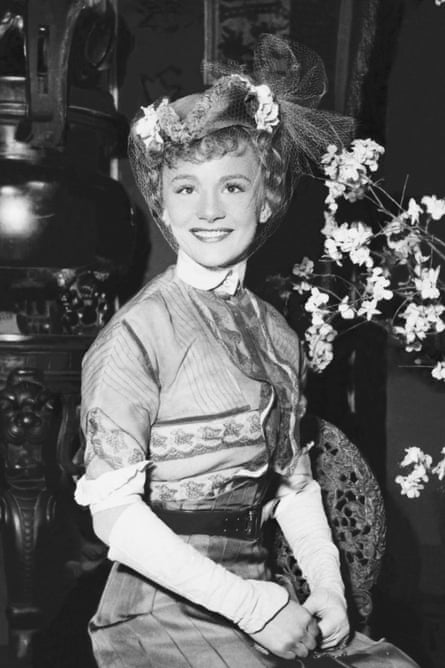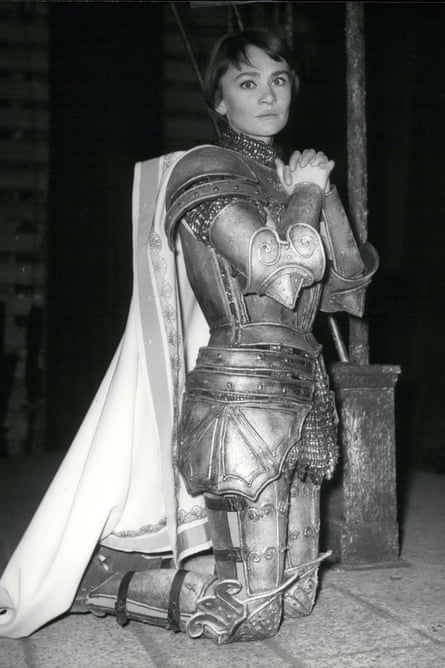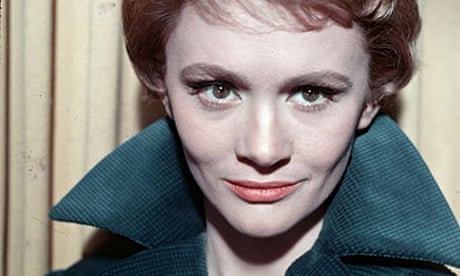Danièle Delorme, who has died aged 89, began acting professionally in 1942 and continued until the end of the century in films, television and theatre. But the earliest part of her long and prestigious career is most remembered internationally.
Delorme started in films as a fragile and elegant, slightly coquettish ingenue, notably in three pictures directed by Jacqueline Audry, based on novels by Colette: Gigi (1949), Minne, l’Ingénue Libertine (1950) and Mitsou (1956). She was described by her first husband, the actor Daniel Gélin, as having “the face of a little girl, an upturned nose with passionate nostrils, the lips of a child, the body of a woman and a certain way about her that turns heads”.
She was born Gabrielle Girard in Paris, one of four children of André Girard, a well-known illustrator and theatre designer, and Andrée (nee Jouan). It was through her father’s contacts that the 16-year-old Gabrielle landed a bit part in La Belle Aventure (1942), directed by Marc Allégret. Allégret gave her a larger role in Les Petites du Quai aux Fleurs (1944) with Gérard Philipe, making his film debut. One of the cast, Bernard Blier, suggested she change her surname to that of the title character in a Victor Hugo play, Marion Delorme (she had already adopted her second name, Danièle). Also in the film, uncredited, was Gélin, whom Delorme married the following year.

She had to wait until 1949 to gain stardom in Miquette et Sa Mère, a surprisingly bright entry into the gloomy oeuvre of director Henri-Georges Clouzot. Delorme is delightful as a girl confined to a strict girls’ school, who runs away with a maladroit young man (Bourvil) to join a travelling theatre run by a ham actor (Louis Jouvet).
This was followed by Gigi, a faithful adaptation of Colette’s novel. The delicate Delorme (who was followed by Audrey Hepburn on stage and Leslie Caron in the Hollywood musical) was perfectly cast as a young girl trained as a courtesan by her aunt, but who opts for true love and marriage to a rake whom she reforms. Of her performance, Le Monde proclaimed her “the surest hope of French cinema … our female Gérard Philipe”.
In the title role of Minne, Delorme is a romantic young woman unable to make love to her possessive husband, who treats her as a child until she gives in to the advances of a philanderer and an old roué. Directed by Audry and played by Delorme with the same sensitivity as the previous Colette adaptation, it was nonetheless the first production released in Britain to gain the newly instituted X certificate, presumably because of its hint of sexual misdemeanour.
Also with a touch of 50s Gallic naughtiness was Mitsou, in which Delorme, looking gorgeous in colour in the title role, is a rather scatterbrained chorus girl in love with a handsome young lieutenant who throws her over because she lacks refined tastes and social graces. A variation on the character of Gigi, she confesses all to her sugar daddy (the suave Fernand Gravey), who generously gives her a crash course in becoming a lady.
But Delorme, by now 30 and newly married to the actor-director Yves Robert (she had divorced Gélin the year before), replaced her naive persona with that of a stronger, more mature woman. This transformation was most evident in Julien Duvivier’s Voici le Temps des Assassins (in the UK, Twelve Hours to Live; in the US, Deadlier Than the Male, 1956). Playing a seemingly angelic young woman, she turns out to be a thoroughly evil gold-digger, hoodwinking a kindly restaurant owner (Jean Gabin) into marrying her, and then murdering him.
Opposite Gabin again, in the umpteenth film adaptation of Les Misérables (1958), Delorme was painfully poignant as the tragic Fantine, forced into prostitution.

In the 60s, Delorme cut down on her acting to concentrate on heading La Guéville, the successful production company that she founded with Robert in 1962. Besides turning out most of the movies directed by him, the company produced films by Jean-Luc Godard, Bertrand Tavernier, Alain Cavalier and Jacques Doillon, among others. Nevertheless, Delorme found time to perform in the theatre in plays by Paul Claudel, Albert Camus and George Bernard Shaw (Saint Joan).
In the 70s, Delorme resumed her film acting career, appearing as a sympathetic French nurse in Vietnam in Raoul Coutard’s Hoa-Binh (1970), as the accomplice of a bank robber (Jean-Louis Trintignant) leading the police on a merry chase through Europe in Claude Lelouch’s Le Voyou (The Crook, 1970), and as a mysterious woman (fantasy or reality?) whom a middle-aged professor meets in the woods in André Delvaux’s Belle (1973).
In two of Robert’s biggest hits – Un Éléphant Ça Trompe Énormément (Pardon Mon Affaire, 1976), remade by Gene Wilder as The Woman In Red in 1984, and its sequel, Nous Irons Tous au Paradis (Pardon Mon Affaire, Too!, 1977) – Delorme had the pivotal role as the staunch wife of a bumbling middle-aged husband (Jean Rochefort) with a roving eye.
Among her later roles was that of a school principal in the TV series Madame Le Proviseur (1994-99), a part created for Delorme, who had become a grande dame of the French film industry.
She is survived by her actor-director grandson, Hugo Gélin. Her son, Xavier Gélin, a film producer, died of cancer in 1999.

Comments (…)
Sign in or create your Guardian account to join the discussion